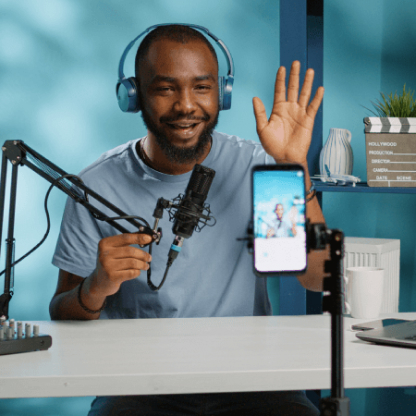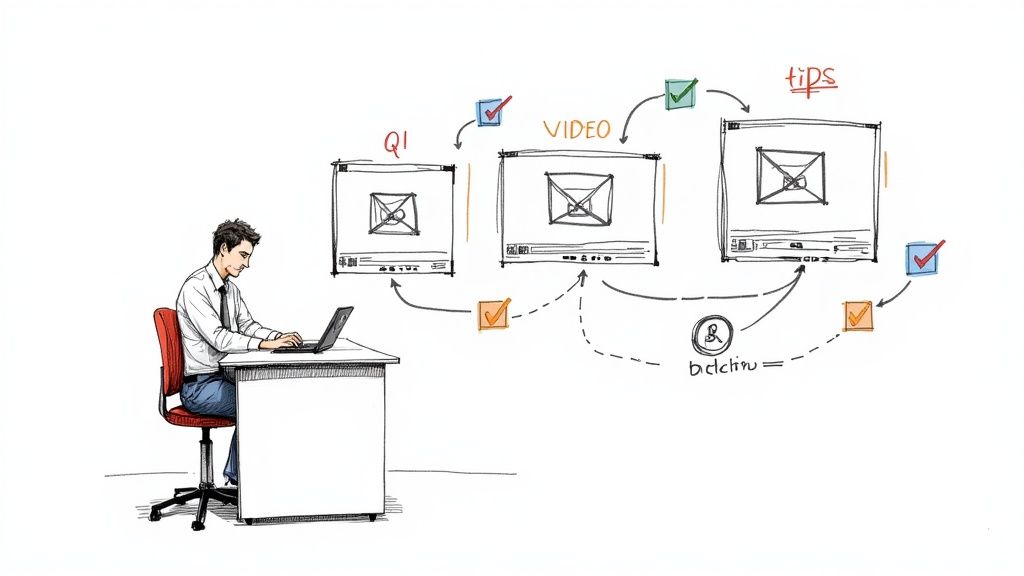Let’s be honest. Most interview questions are tired, predictable, and about as revealing as a corporate mission statement. You ask, they give a perfectly rehearsed answer, and you both nod, knowing you’ve learned almost nothing. I’ve been there, hiring dozens, maybe hundreds of people, and making every mistake in the book. I've asked the 'gotcha' questions, the philosophical brain-teasers, and the ones straight from a 1990s HR manual. The result was a coin toss, not a confident hire.
Turns out, finding top talent isn't about tricking candidates; it’s about having a real conversation. But you need the right conversation starters. Hope you enjoy spending your afternoons fact-checking resumes and running endless interview loops, because if you're using the same old script, that’s your full-time job now. This isn't just another listicle. This is a battle-tested toolkit of the best questions to ask when interviewing someone, designed to cut through the fluff and show you who's really sitting across the table (or screen).
We’re going to dismantle the most common questions, one by one, and rebuild them to get real, unscripted insights. This guide will show you how to transform "What's your greatest weakness?" from a throwaway line into a powerful probe of self-awareness and coachability. You'll learn why the intent behind each question matters more than the words themselves. To move beyond broken hiring, it's essential to consider all aspects of the talent acquisition process and adopt effective recruitment practices that focus on substance over style.
In this roundup, we’ll give you the exact phrasing, the "why" behind it, and what to listen for in the answers. Stop guessing and start hiring with clarity. Let's get to it.
1. Tell me about yourself
This isn't just a warm-up; it's the opening pitch. "Tell me about yourself" is one of the best questions to ask when interviewing someone because it hands the candidate the microphone and says, "Show me what you've got." You're not looking for their life story or their weekend hobbies. You're looking for their professional narrative, crafted specifically for this role, right now.

A great answer is a concise, 2-3 minute highlight reel connecting past experiences to your company's future needs. A rambling, unfocused response? That’s your first red flag, telling you more about their preparation and communication skills than a dozen other questions might.
Why It's a Goldmine
This question is a powerful diagnostic tool. Tech giants like Google use it to see if a candidate can connect their personal journey to the company's mission. At Amazon, interviewers are listening for early signs of their Leadership Principles. Consultants at McKinsey famously use it to assess a candidate's ability to structure a narrative and communicate with clarity. It’s an efficiency hack for assessing soft skills from the get-go.
How to Make It Work for You
Don't just throw the question out there and hope for the best. Guide the candidate toward the answer you need to hear.
- Add a Frame: Instead of the generic opener, try: "Could you walk me through your professional background in about 2-3 minutes and how it led you to apply for this role?" This immediately sets a clear focus and time constraint.
- Listen for the "Why": Pay attention to what they choose to emphasize. Did they talk about a project that directly relates to a key responsibility in your job description? That shows they’ve done their homework.
- Identify Follow-Up Threads: Their story is your interview roadmap. Note the skills, projects, or accomplishments they mention and use them as jumping-off points for deeper, more specific questions later.
Using this question effectively transforms it from a polite formality into a strategic starting point. To explore this further, you can learn more about how to conduct effective interviews and what to look for in those critical first few minutes.
2. What are your greatest strengths?
This classic question isn’t about fishing for compliments; it’s a direct probe into a candidate’s self-awareness and alignment with the role. Asking "What are your greatest strengths?" is one of the best questions to ask when interviewing someone because it forces them to move beyond their resume bullet points and articulate their value proposition. You're not looking for generic humblebrags; you're looking for a confident, evidence-based pitch.
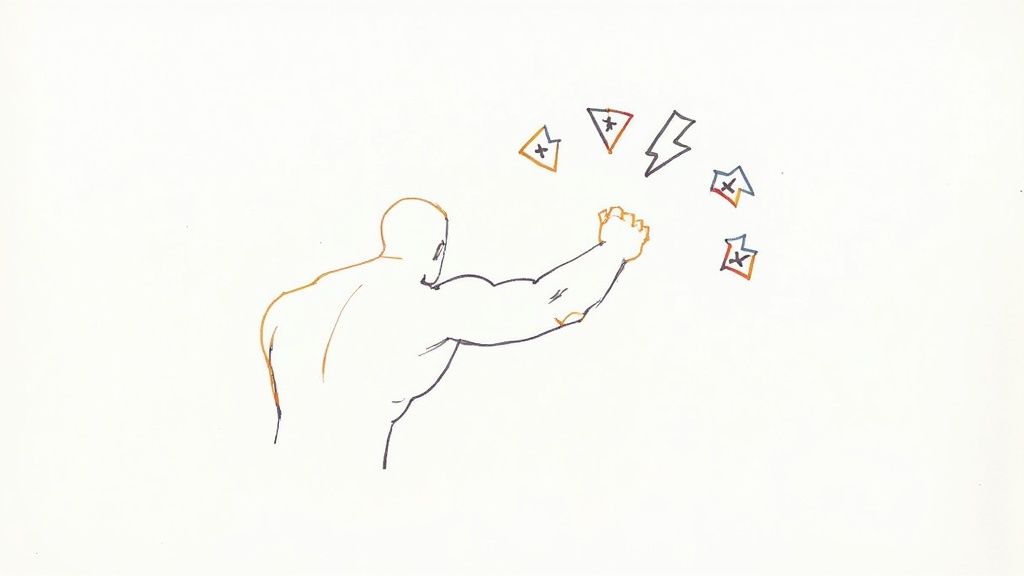
A strong answer connects a specific skill directly to a business outcome, proving they understand what the job actually requires. A weak response is vague, cliché ("I'm a hard worker"), or completely misaligned with your job description. That’s an immediate signal they haven't thought critically about how they can contribute.
Why It's a Goldmine
This question quickly separates the prepared from the unprepared. At Deloitte, interviewers look for strengths demonstrated with concrete examples of client impact. Tech leaders like Microsoft use it to see if a candidate’s strengths in areas like collaboration or problem-solving fit their team-oriented culture. It’s an efficient way to gauge whether their perceived value matches your actual needs. The concept is heavily influenced by the strengths-based leadership movement, popularized by Gallup's StrengthsFinder, which argues for building teams around individual talents.
How to Make It Work for You
Don't let the candidate get away with a canned answer. Your follow-ups are what turn this question into a powerful evaluation tool.
- Demand Proof: After they state a strength, immediately ask: "Can you give me a specific example of a time you used that strength to solve a problem or achieve a goal?" This pushes them from theory to practice.
- Check for Alignment: Listen for strengths that directly address the core responsibilities or challenges listed in the job description. If you need a detail-oriented analyst, and they only talk about their "big-picture thinking," you have a potential mismatch.
- Connect to the Team: Follow up with, "That's a great skill to have. How do you see that specific strength benefiting our team and its current projects?" This tests their ability to think beyond themselves and consider the collective.
Using this question strategically allows you to cut through the fluff and assess a candidate's practical skills and self-perception in one go. You’ll learn more about their potential contribution from this exchange than from ten generic questions combined.
3. What is your greatest weakness?
This is the question everyone loves to hate, but it remains one of the best questions to ask when interviewing someone for a reason. You're not trying to trip them up or find a fatal flaw. You're testing for self-awareness, honesty, and a commitment to growth. How a candidate handles this question reveals more about their character than their actual weakness.
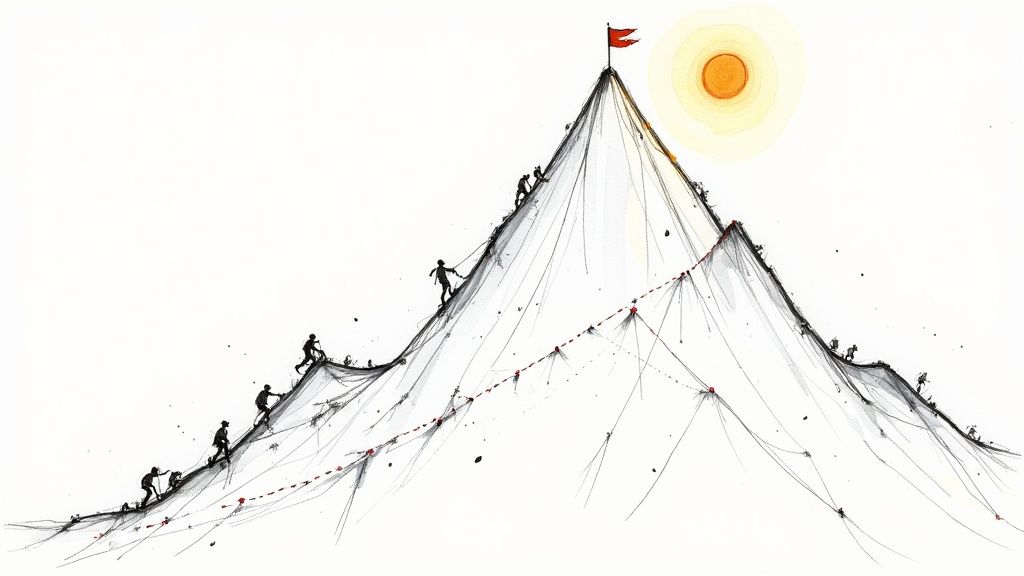
A good answer is a genuine reflection paired with a concrete action plan for improvement. A rehearsed, cliché response like "I'm a perfectionist" or "I work too hard"? That’s a major red flag, signaling a lack of preparation, authenticity, or both. You want someone who has actually thought about their development, not just googled "good weaknesses for an interview."
Why It's a Goldmine
This question is a powerful probe for emotional intelligence and cultural fit. At Netflix, where radical candor is a core value, an authentic acknowledgment of a real weakness is respected. Investment banks like Goldman Sachs look for candidates who can frame a weakness strategically, demonstrating they are actively mitigating it. Meanwhile, Zappos uses the response to see if a candidate’s mindset for self-improvement aligns with their people-first culture. It’s your shortcut to understanding if they can handle feedback and are truly invested in getting better.
How to Make It Work for You
Don’t just ask the question and wait for the cringe. You can guide the conversation to get a more insightful answer and avoid the generic fluff.
- Reframe the Question: Soften the bluntness and focus on growth. Try asking, "What's a professional area you're actively working to improve right now?" This shifts the focus from a static flaw to dynamic development.
- Listen for Specifics, Not Clichés: A great answer includes an example and the steps being taken. If they say they struggle with public speaking, ask them what they're doing about it. A good answer might mention joining Toastmasters or volunteering to lead team meetings.
- Assess the Impact: Consider if the weakness they mention is a dealbreaker for the role. A graphic designer who admits they're not a strong writer is fine; a copywriter who says the same thing is a problem.
- Use Follow-Ups: Dig deeper with questions like, "Can you tell me about a time this weakness was a challenge at work?" or "What steps have you taken to address this in the last six months?" This separates the honest candidates from those just trying to give the "right" answer.
4. Why do you want to work here?
This question cuts through the noise. It separates the candidates who want a job from those who want this job. "Why do you want to work here?" is one of the best questions to ask when interviewing someone because it’s a direct probe into their motivation, research, and alignment. You're not looking for flattery; you're looking for a genuine connection between their aspirations and your company's reality.
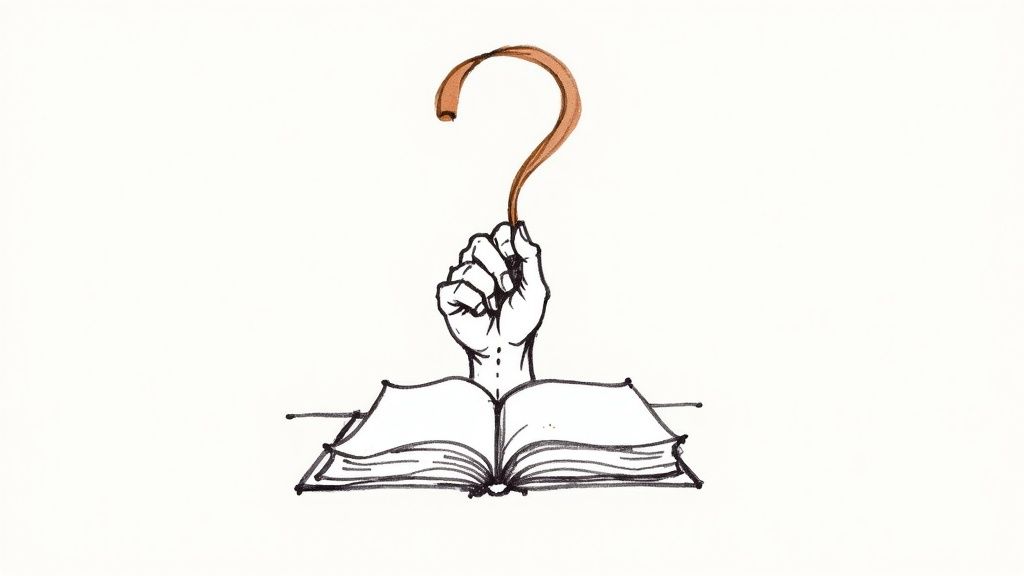
A great answer is specific, citing company values, recent projects, or a unique aspect of the culture they admire. A generic response about "a great opportunity" or "a growing company" is your cue that they’ve sent out 50 other applications with the same level of enthusiasm. This question isn't a formality; it's a litmus test for genuine interest.
Why It's a Goldmine
This question is a powerful filter for cultural and motivational fit. Outdoor apparel company Patagonia famously uses it to weed out candidates who don’t live and breathe their environmental mission. For a startup, this question reveals a candidate's belief in the product vision and their stomach for ambiguity. At Apple, they’re listening for a deep-seated passion for innovation and design, not just a desire to work for a big name. The answer reveals what truly drives them, beyond a paycheck.
How to Make It Work for You
Don’t just ask the question; dig into the answer. Your goal is to uncover the truth behind their prepared response.
- Listen for Specifics: Did they mention a particular blog post, a product feature they love, or a team member's work they follow? Specifics show they've done more than a 5-minute scan of your homepage.
- Probe the Mission: Follow up with, "What specifically about our mission or values resonates with you personally?" This pushes them beyond reciting your "About Us" page and asks for a personal connection.
- Connect to Their Goals: A strong candidate will link their desire to work for you with their own long-term career ambitions. Look for a clear line connecting what your company offers to where they want to go.
- Be Transparent: If their answer romanticizes a part of the job that's actually grueling, be honest. A good fit is a two-way street, and setting clear expectations avoids a mismatch down the road.
5. Describe a challenging situation and how you handled it
This question cuts through the rehearsed answers and gets straight to the good stuff: evidence. Asking a candidate to detail a past challenge is one of the best questions to ask when interviewing someone because it moves beyond hypotheticals. You’re not asking what they would do; you’re asking what they did. It's a real-world stress test of their problem-solving, resilience, and accountability.
A great answer follows a clear narrative: problem, action, outcome. They own their role without blaming others and can articulate what they learned. A weak answer is vague, full of "we" instead of "I," or worse, describes a conflict they clearly mishandled. That's a direct preview of how they might handle pressure on your team.
Why It's a Goldmine
Past behavior is the single best predictor of future performance. This isn't just a hunch; it's the core principle of behavioral interviewing. Amazon built its entire interview process around this, mapping questions like this to its Leadership Principles to see if candidates have a "Bias for Action" or "Deliver Results." At McKinsey, consultants are judged on their ability to deconstruct complex problems, and this question reveals that thought process. Healthcare organizations use it to probe ethical decision-making when the stakes are high. It’s your window into their on-the-job character.
How to Make It Work for You
Don’t just ask the question and passively listen. You need to direct the conversation to get the data you need.
- Frame It with STAR: Guide them toward a structured answer. Say, "Can you walk me through a specific situation, the task you faced, the actions you took, and the result?" This keeps them focused and gives you a clear framework for evaluation.
- Drill Down on "I": If they keep saying "we," politely interrupt. Ask, "That sounds like a great team effort, but what was your specific contribution?" You need to isolate their actions from the group's.
- Ask About the Aftermath: The story doesn't end with the result. Follow up with, "Looking back, what would you do differently now?" This tests for self-awareness and a capacity for growth, not just problem-solving.
Effectively using this question helps you understand not just a candidate's skills, but their professional maturity. To learn more about navigating these critical conversations, explore ways of tackling workplace issues with grace.
6. Where do you see yourself in 5 years?
This isn’t about prying into personal dreams; it’s a strategic alignment check. "Where do you see yourself in 5 years?" is one of the best questions to ask when interviewing someone because it’s a gut check on longevity and ambition. You’re asking them to draw a map, and you need to see if their destination is even in the same state as your company’s future.
A great answer shows a balance of ambition and realism, demonstrating that the candidate has thought about their career trajectory and how this role fits into it. A vague "I just want to be growing" answer is a red flag. It suggests a lack of direction, which means they might jump ship the second a shinier opportunity appears.
Why It's a Goldmine
This question is a powerful tool for gauging fit and retention potential. Major consulting firms use it to see if a candidate understands the demanding partner track timeline. Fast-growing tech startups, on the other hand, listen for an appreciation of ambiguity and a readiness to pivot as the company evolves. It’s a shortcut to understanding if their goals are compatible with the reality of what you can offer.
How to Make It Work for You
Don’t let this question become a stale formality. Make it a genuine conversation about mutual growth.
- Listen for Skill vs. Title: Does their answer focus on acquiring new skills, leading bigger projects, and increasing their impact? Or is it just about climbing a ladder to get a fancier title? The former is a sign of a growth mindset; the latter can be a sign of entitlement.
- Reframe for Clarity: If the traditional phrasing feels too stiff, try a variation like, "What kind of skills or experiences are you hoping to gain in the next few years to advance your career?" This focuses the conversation on development, which is often more telling.
- Check for Alignment, Not a Mirror Image: Their plan doesn’t have to match your corporate ladder rung-for-rung. But it should be compatible. If a candidate wants to become a C-level executive in three years at your 10,000-person company, their expectations are misaligned with reality. Their ambition needs to fit the opportunity you provide.
7. Why are you leaving your current job?
This is the "show me your cards" moment of the interview. "Why are you leaving?" is one of the best questions to ask when interviewing someone because it strips away the curated resume and gets to the heart of their motivation. Are they running away from something bad, or are they running toward something great? The answer tells you everything about their professional maturity, self-awareness, and what they truly value in a workplace.
A great answer focuses on the future and growth, framing the departure as a strategic move toward new challenges or opportunities that your role provides. A response riddled with blame, negativity, or vague complaints is a major red flag, suggesting they might bring that same drama to your doorstep.
Why It's a Goldmine
This question is a powerful predictor of future behavior and cultural fit. Standard HR and recruitment methodologies rely on it to uncover potential issues before they become your problem. For example, a tech company might ask this to see if a candidate is leaving because their previous company wasn't innovative enough, a key indicator for a fast-paced environment. A remote-first company needs to know if the primary driver is simply a desire to work from home or a genuine interest in the role itself.
It’s a deceptively simple question that helps you assess a candidate’s professionalism and discretion. How they talk about a past employer is likely how they’ll one day talk about you.
How to Make It Work for You
Your job is to dig past the polished, rehearsed answer and get to the real story. Don't just accept the first thing they say.
- Listen for the Pattern: Cross-reference their answer with their resume. If they claim to be seeking "growth opportunities" but have a history of short stints at various companies, it's time to probe deeper. Ask, "What does ideal growth look like for you in the next two years?"
- Watch for Blame vs. Ownership: Pay close attention to the language they use. Do they blame former managers, colleagues, or the company for their dissatisfaction? Or do they take ownership of their career path and frame the move as their own decision for positive reasons?
- Assess the "Push vs. Pull": A candidate "pulled" toward your role's specific opportunities is far more desirable than one "pushed" out of their old job by negative circumstances. The former is motivated by ambition; the latter, by desperation.
8. What are your salary expectations?
This is the question that separates dreamers from doers. Asking about salary expectations isn't just a budget check; it's a critical alignment test that can save everyone hours of wasted time. This is one of the best questions to ask when interviewing someone because it moves past hypotheticals and into the practical reality of making a deal. You’re not just hiring a skill set; you're entering a financial partnership.
A confident, well-researched answer shows you a candidate who knows their market value. A hesitant or wildly off-base response? That's a signal that their expectations might not align with reality, or they haven't thought through what it takes to join your team. Getting this out in the open early prevents heartbreak at the offer stage.
Why It's a Goldmine
This question is a powerful tool for gauging a candidate's professionalism and market awareness. Companies like Buffer, known for their transparent salary formulas, have built their entire compensation philosophy around this kind of openness. In the startup world, this question opens the door to discussing equity and growth potential, which is often as important as the base pay. It’s also where negotiation skills first come into play, giving you a preview of how a candidate might handle high-stakes conversations in their role.
How to Make It Work for You
Asking about money can be awkward, but it doesn't have to be. Frame the conversation to get the information you need while building trust.
- Share Your Range First: To avoid a guessing game, lead with transparency. Try: "Just so we're aligned, the budgeted range for this role is between X and Y. Does that fall within your expectations?" This sets a realistic foundation.
- Focus on Total Compensation: Base salary is just one piece of the puzzle. Ask, "What are you looking for in terms of total compensation, including benefits, potential bonuses, or equity?" This gives you a complete picture.
- Frame It Collaboratively: Instead of making it feel like a confrontation, use a softer approach. "To make sure we can put together a compelling offer, could you share what would make you feel fairly compensated for your skills and experience in this role?"
- Know the Law: Be aware of and respect salary history ban laws in your jurisdiction. The focus should always be on future expectations, not past earnings.
9. Do you have any questions for me?
This isn't just a polite way to wrap up; it's the moment you flip the script. "Do you have any questions for me?" is one of the best questions to ask when interviewing someone because it shifts power to the candidate, forcing them to reveal what they really care about. Their curiosity (or lack thereof) is a massive data point on their engagement, preparation, and strategic thinking.
A great candidate comes armed with thoughtful, specific inquiries that show they've moved beyond your "About Us" page. A candidate with zero questions? That’s a blaring red flag signaling low interest or a critical lack of preparation. Either way, it's not a good look.
Why It's a Goldmine
This question is your final, and often most revealing, diagnostic tool. Career coaches and modern hiring practices, highlighted in resources like What Color Is Your Parachute?, emphasize the interview as a two-way street. The questions a candidate asks reveal their priorities: Are they focused on compensation, culture, technology, or strategy?
A leadership candidate asking about organizational challenges shows they're thinking about impact. A software engineer inquiring about your tech stack and deployment frequency demonstrates genuine technical curiosity. You're not just getting answers; you're getting a direct look into their professional mindset.
How to Make It Work for You
Don't treat this as a throwaway moment at the end of the interview. It's a strategic part of your evaluation.
- Budget Your Time: Intentionally leave at least 10-15 minutes for their questions. Rushing this signals that you don't value their perspective.
- Listen for Depth: Are their questions generic ("What's the company culture like?") or specific ("I saw you launched Project X last quarter; how has that impacted the team's daily workflow?"). The difference tells you everything about their level of research.
- Identify Priorities: Note what they ask about first. Questions about growth, learning, and long-term impact are signs of an engaged, ambitious candidate. Questions only about vacation policy and perks might indicate different priorities.
By turning this closing formality into a key evaluation point, you gain a final, crucial insight into a candidate's fit. For more ideas on how to round out your interview process, discover more about what to ask an applicant during an interview.
Top 9 Interview Questions Comparison
| Question | Implementation Complexity 🔄 | Resource Requirements ⚡ | Expected Outcomes 📊 | Ideal Use Cases 💡 | Key Advantages ⭐ |
|---|---|---|---|---|---|
| Tell me about yourself | Low – simple, open-ended | Minimal – just interviewer prompt | Communication skills, self-awareness | Interview icebreaker, general interviews | Builds rapport, reveals priorities |
| What are your greatest strengths? | Medium – requires probing | Moderate – follow-up questions | Self-awareness, role alignment | Competency-based interviews | Identifies key skills, confidence |
| What is your greatest weakness? | Medium – needs sensitive handling | Moderate – skillful follow-up needed | Honesty, growth mindset | Assessing emotional intelligence, self-reflection | Reveals self-awareness, coachability |
| Why do you want to work here? | Medium – preparatory research needed | Moderate – candidate preparation | Motivation, cultural fit | Assessing candidate-company alignment | Identifies genuine interest, retention hints |
| Describe a challenging situation | High – requires structured approach | High – time for detailed responses | Problem-solving, resilience, accountability | Behavioral interviews, competency assessments | Predictive of future job performance |
| Where do you see yourself in 5 years? | Medium – future-oriented discussion | Low – mainly interview conversation | Career ambition, retention likelihood | Long-term roles, succession planning | Reveals ambition, planning skills |
| Why are you leaving your current job? | Medium – delicate conversation | Moderate – requires careful probing | Motivations, professionalism, red flags | Transition assessment, cultural fit | Early identification of misalignment |
| What are your salary expectations? | Low – direct question | Low – straightforward question | Budget alignment, market knowledge | Compensation discussion, negotiation | Saves time, sets clear expectations |
| Do you have any questions for me? | Low – candidate-led | Low – interviewer readiness | Candidate engagement, research depth | Interview closing, assessing candidate fit | Reveals curiosity, shows preparation |
The Real Question: Are You Ready to Hire Smarter?
So there you have it. You’re now armed with a toolkit of questions designed to do more than just fill an awkward silence. We’ve deconstructed the classics like "Tell me about yourself" and "What’s your greatest weakness?" and rebuilt them into strategic tools that reveal a candidate’s true character, problem-solving skills, and cultural alignment. You've learned how to turn a generic script into a dynamic, insightful conversation.
But let’s be honest. Asking the best questions to ask when interviewing someone is only half the battle. The other, arguably more grueling, half is managing the entire process. It’s the scheduling chaos, the no-shows, the endless back-and-forth between hiring managers, and the nagging feeling that you let a superstar slip away because your calendars didn’t align.
Hope you enjoy spending your afternoons fact-checking resumes and coordinating schedules, because without the right system, that’s now your full-time job. The real bottleneck isn't finding good questions; it's creating a scalable process that lets you consistently evaluate the answers.
From Good Questions to a Great Process
The transition from asking smart questions to making smart hires requires a fundamental shift in your methodology. It’s not just about what you ask, but how you ask it and what you do with the information afterward. A truly effective hiring process is built on three core pillars:
- Consistency: Every candidate for a specific role should get the same core questions, in the same format. This isn't about being robotic; it's about establishing a fair, unbiased baseline for comparison. When one candidate gets softball questions from a cheerful interviewer and another gets grilled by a skeptical manager, you're not evaluating candidates. You're evaluating interview experiences.
- Collaboration: Hiring shouldn't be a solo sport. The best decisions come from collective insight. Your process must make it ridiculously easy for stakeholders to review interviews, leave structured feedback, and compare notes without needing to be in the same room at the same time. If feedback is scattered across Slack threads, emails, and random notes, you’re making a decision based on noise, not data.
- Efficiency: Your time, your team's time, and the candidate's time are all finite resources. A great process respects that. It eliminates the logistical drag of scheduling live interviews for initial screening, allowing you to focus your high-touch efforts on the most promising candidates later in the funnel.
For organizations looking to refine their approach, understanding the nuances of professional hiring is key. This is where specialized knowledge comes in. Grasping the full scope of recruitment consultant duties and responsibilities can provide valuable insights into how experts structure these very processes, helping you optimize everything from initial screening to final offer.
Ultimately, mastering the best questions to ask when interviewing someone is a critical first step. The next is to build an operational framework that allows those questions to deliver maximum impact. It’s about moving beyond just asking and into a system of structured, data-driven evaluation. It turns out there’s more than one way to hire elite talent without mortgaging your office ping-pong table. A better process starts with better tools. That's where we come in (toot, toot!).
Ready to stop the endless cycle of interviews that go nowhere? Async Interview helps you standardize your best questions, review candidates on your schedule, and make collaborative hiring decisions faster. Stop talking about smarter hiring and start doing it.

